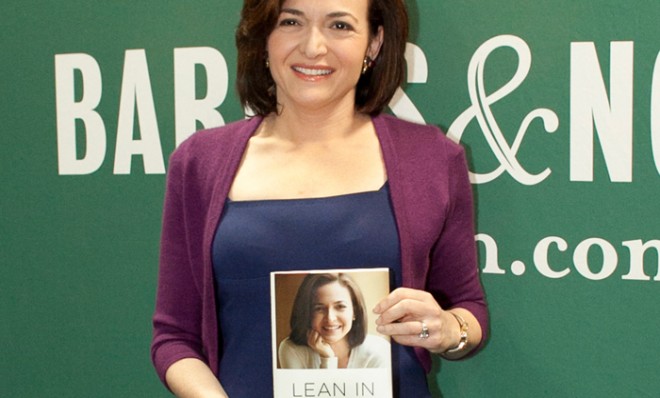5 smart responses to Sheryl Sandberg's Lean In
A collection of unique and thoughtful arguments that rise above the frenzy over the Facebook COO's manifesto on women and the workplace


A free daily email with the biggest news stories of the day – and the best features from TheWeek.com
You are now subscribed
Your newsletter sign-up was successful
Facebook COO Sheryl Sandberg has her critics. And with the publication of her new book, Lean In: Women, Work, And The Will To Lead, she has, fairly or not, acquired many more.
In Lean In, Sandberg presents personal stories and anecdotes from high-ranking friends and former colleagues, contrasting them with a slew of data and research about American women and the workplace. Sandberg posits that due to forces both internal and external, women make small decisions throughout their career that impede their progress. Whether it's planning ahead for a family, feeling obligated to think of others before themselves, or shying away from their triumphs, women's degenerative choices over time have resulted in the gender as a whole earning only 77 cents for every dollar men make, and holding only "a meager twenty-one" of the Fortune 500 CEO positions. In other words, the world is still run by men. Sandberg's advice is for younger generations to overcome these obstacles by "leaning in" to their careers.
In some quarters, the book has been hailed as "the next great feminist manifesto." In others, Lean In has been disparaged as "victim-blaming," or "the elite leading the slightly-less-elite, for the sake of Sandberg's bottom line."
The Week
Escape your echo chamber. Get the facts behind the news, plus analysis from multiple perspectives.

Sign up for The Week's Free Newsletters
From our morning news briefing to a weekly Good News Newsletter, get the best of The Week delivered directly to your inbox.
From our morning news briefing to a weekly Good News Newsletter, get the best of The Week delivered directly to your inbox.
If you want to get in on the conversation but don't want to wade through the more absurd or knee-jerk reactions, here are five thoughtful, smart, and unique responses — both critical and supportive — to Sandberg's Lean In. Read on, and join in.
1. Sandberg finally puts words to young women's long-unarticulated feelings
There is more to Lean In than just the book. Sandberg has prepared instructional videos, pamphlets, hashtags, a marketing campaign, and a website meant to encourage women to start their own "lean in" support groups. Jessica Bennett from New York not only attended such a meeting, but also organized a spur-of-the-moment group of her own, where young women discussed things like how to tackle their insecurities. Bennett, who was raised in the "Girl Power era of the eighties," says Lean In finally gives women of her age group the "words to say what we'd long felt but couldn't quite articulate."
Sandberg may never be feminist enough, grassroots enough, inclusive enough, mom enough for everyone. But she has labeled a solution for problems that are rampant among a generation raised to believe that we were on level footing — and a pragmatic approach to change it. She's also managed to bridge a gap that has mystified many an activist before her: reaching women who both self-identify as feminists (me), and those who don't (the women I met at the first Lean In circle). She is, as one colleague recently joked, the first embodiment of "Big Feminism" (think Big Pharma, but with nicer hair)." [New York]
2. But her advice can be contradictory
A free daily email with the biggest news stories of the day – and the best features from TheWeek.com
Lean In is part memoir, part self-help book, part career-management how-to, and part feminist manifesto. This fractured identity isn't helping the COO's cause, says Amanda Hess at Slate. Through 11 chapters, the frank, often depressing facts of a woman's climb up the slippery corporate ladder are buoyed by the stories of how Sandberg surmounted such workplace obstacles and instructions on how women can follow suit. But the result "doesn't square up," Hess says. For example, Sandberg says success and likability are "positively correlated for men and negatively correlated for women." She also says that likability is occasionally necessary as "people want to hire and promote those who are both competent and nice," and so at these crucial moments women should "combine niceness with insistence." Once again, women have to be accommodating to the world around them. Hess continues:
Reading Sandberg's book, it's clear that women don't just need to lean in. They need to carefully calibrate the angle of their approach to suit every possible scenario. When Sandberg is in "feminist manifesto" mode, she is honest about this. She admits that navigating the double standards of the American workplace is as easy as "trying to cross a minefield backward in high heels." But when she flips to memoir, the implication is that she tilted herself just-so and that other women can, too." [Slate]
3. And uses staid understandings of gender differences
Women often "sell themselves short and pull back too early from their careers," says Christina Hoff Sommers at The Atlantic. But Sandberg may also be holding women back by using dated gender stereotypes. It isn't always society's gender trickery that makes little girls favor princesses and boys admire superheroes — it may actually just be human nature. And Sandberg's attempt to liberate American women from such gender stereotypes may be only hindering their true path to freedom.
An up-to-date manifesto on women and work should steer clear of encounter groups and boys-must-play-with dolls rhetoric. It should make room for human reality: that in the pursuit of happiness, men and women often take different paths. Gender differences can sometimes be symptoms of oppression and subordination. But in a modern society they can also be the felicitous consequences of liberated choice — of the "free to be you and me" that women have been working towards for generations. [The Atlantic]
4. Sandberg isn't speaking for all women, and she shouldn't have to
Many critics are quick to point out the high perch from which Sandberg doles out advice. She is a wealthy white woman and her problems, or the ones she addresses in her book, are those suffered by only the elite. And it's true, says Daniella Gibbs Léger in Essence, that Lean In doesn't speak to lower-income women or women of color. But why should it? Sandberg is sharing her unique experiences that, even she acknowledges, aren't the average woman's. And like all women, Sandberg should be encouraged to do so, not attacked because of it. If we continue down this path, women may grow hesitant to share at all, which impedes our progress altogether.
Sandberg shouldn't be raked over the coals for telling her life story, even if we don't see ourselves in it. The onus is on media and others to make sure that the story of women of color in the workplace gets told. And there are plenty of brilliant women out there to choose from. Ursula Burns comes to mind; she grew up poor in NYC only to become the CEO of Xerox... I genuinely believe that the place for us to lean in, as it were, is on those who have the power to tell more balanced stories — they have both the power and the responsibility to do so. [Essence]
5. But we still need an option beyond just work and motherhood
The debate Sandberg inspired about women in the workplace has spawned a counter-dispute focusing on women who choose to withdraw from the professional world altogether. A cover story in New York magazine called "The Retro Wife" anecdotally suggests that a growing crop of well-educated, hard-working feminists are forgoing the work-life balance and choosing to stay home. Writer Lisa Belkin actually wrote about this very same trend a decade ago for the New York Times Magazine in an article called "The Opt-out Revolution." But, Belkin now says at The Huffington Post, the problem is not that the trend or the debate is ongoing. The problem is that we are all mistaken — that women choose to stay home is an illusion. While young women today, armed with information and expectations their Baby Boomer parents didn't have, may indeed opt to leave the workforce, they are more likely pushed than spiritually pulled home.
Looking back over 10 years and a lot of reporting, I have come to see my mistake when writing "The Opt-Out Revolution." I confused being pulled toward home with being pushed away from work. I did not fully understand, though, that what looked like a choice was not really what these women wanted most. Had their workplaces been ones that adapted to a world in which workers no longer have other halves (read: wives) focusing on home so that they can focus on the job, and where technology could be used to free employees from their desks physically rather than tethering them metaphorically, and where the "ideal worker" was understood to have priorities outside of the office — in other words, if they'd had a third path — they might well have taken it… Until we find that new path, women — and men, it's important to note — who can afford to step off the existing path will continue to do so. [Huffington Post]
Lauren Hansen produces The Week’s podcasts and videos and edits the photo blog, Captured. She also manages the production of the magazine's iPad app. A graduate of Kenyon College and Northwestern University, she previously worked at the BBC and Frontline. She knows a thing or two about pretty pictures and cute puppies, both of which she tweets about @mylaurenhansen.
-
 The ‘ravenous’ demand for Cornish minerals
The ‘ravenous’ demand for Cornish mineralsUnder the Radar Growing need for critical minerals to power tech has intensified ‘appetite’ for lithium, which could be a ‘huge boon’ for local economy
-
 Why are election experts taking Trump’s midterm threats seriously?
Why are election experts taking Trump’s midterm threats seriously?IN THE SPOTLIGHT As the president muses about polling place deployments and a centralized electoral system aimed at one-party control, lawmakers are taking this administration at its word
-
 ‘Restaurateurs have become millionaires’
‘Restaurateurs have become millionaires’Instant Opinion Opinion, comment and editorials of the day
